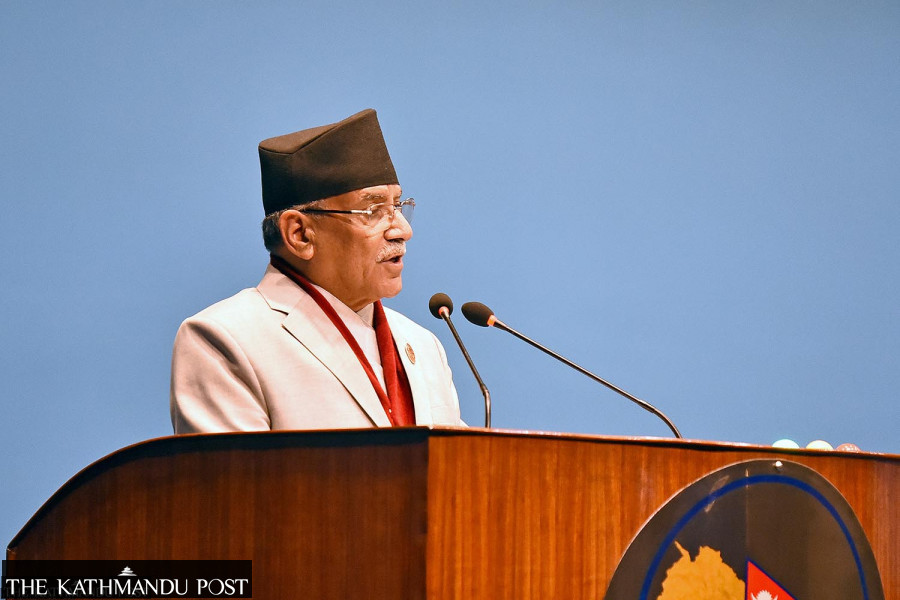Politics
Will Dahal have to go for floor test a third time if any party pulls support?
Opinion is divided. Some argue floor tests are not needed until the government falls into minority.
Binod Ghimire
The Rastriya Swatantra Party (RSP), the fourth largest force in the House of Representatives, is deciding on Monday whether or not to continue its support to the Pushpa Kamal Dahal government. The Janamat Party too is making its position clear on the issue in a week.
Both the parties were in the Dahal Cabinet, but later pulled out expressing their dissatisfaction with the allocation of ministries. They, however, have not withdrawn their support to the government. The RSP has called its parliamentary party meeting for Monday to take a decision on the matter.
The Janamat Party too is not satisfied with Dahal for two reasons: First, he refused to allocate the Ministry of Industry, Commerce and Supplies to it, and second, the ruling alliance supported Upendra Yadav, the Janata Samajbadi Party chairperson, in the Bara-2 by polls.
“We are not satisfied with the ruling alliance’s attitude towards our party. Time has come for us to reconsider our support to the government,” Chandan Singh, the Janamat Party general secretary, told the Post. While the positions of the two parties regarding their support to the government will soon become apparent, experts are divided on whether Dahal needs to undergo a floor test in the event of the parties withdrawing their support.
Article 100 (2) of the Constitution of Nepal says “the prime minister shall table a motion for the vote of confidence in the House of Representatives if the party which the prime minister represents is divided or the party in the government withdraws its support.”
As per some experts, Dahal must go through a floor test if respects the constitution. Ganesh Datta Bhatta, a former associate professor at Nepal Law Campus, said the constitution clearly says the prime minister must face a floor if any of the parties in the government withdraws its support. “There is no ambiguity in the constitution. Dahal must face the vote of trust if the RSP and Janamat or one of them withdraws support,” Bhatta told the Post. Dahal needs the support of at least 138 lawmakers to prove he commands a majority.
In his first vote of trust on January 10, Dahal garnered the support of 268 lawmakers in the 275-strong lower house. He had to opt for the floor test again on March 20 after the CPN-UML and the Rastriya Prajatantra Party revoked their support to his government.
Dahal survived, securing 172 votes. Along with the CPN (Maoist Centre), he received a vote of confidence from the Nepali Congress, the Rastriya Swatantra Party, the Janata Samajbadi Party, the CPN (Unified Socialist), the Janamat Party, the Loktantrik Samajbadi Party, the Nagarik Unmukti Party, three independent lawmakers and the Rastriya Janamorcha.
Other constitution experts, however, don’t buy Bhatt’s opinion. They argue that there is no need for a floor test until there is a situation of the government falling into minority. Mohan Lal Acharya, a constitutional lawyer, says as Dahal will continue to command majority even after the RSP and the Janamat withdraw their support, floor test is unnecessary. The RSP has 21 lawmakers while the Janamat has six. Dahal will still have the support of 141 lawmakers even if both the parties leave him.
“The government’s time will be wasted in floor tests if it starts proving the House's confidence every time fringe parties withdraw their support. A vote of trust is not mandatory as long as Dahal has the support of the majority,” Acharya told the Post. Similar debate had ensued when the Upendra Yadav-led Janata Samajbadi withdrew its support to the KP Sharma Oli government in December 2019.
Oli didn’t go for a floor test saying that he commanded a majority. Compared to now, the situation was different then as Oli was leading a majority government of Nepal Communist Party (NCP). Dahal is leading a coalition government now.
“The House is the only place to prove majority. How can we ascertain whether Dahal commands a majority without testing it in Parliament?” questioned Bhatta, countering Acharya’s argument.




 18.12°C Kathmandu
18.12°C Kathmandu















